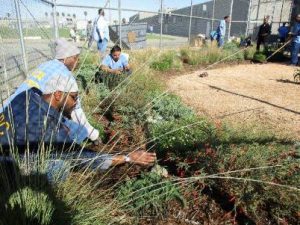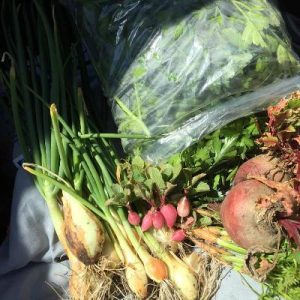You can find hope in any garden not suffocated by weeds, and even then, there’s still hope – if you get in there and pull every last weed, restoring order to a system gone wild. One inmate gardening program has such a track record of its success in repeat crime prevention upon re-entry that it’s now expanding nationwide. Given the strong connection between humans and soil, that in itself is not surprising. Soil, especially organic soil, is a powerful healer of the mind, body, and soul.

How powerful? Sticking to today’s niche on the subject… a reduction of 20% sounds great to any community. That’s certainly proof that gardening is capable of turning people heading down the wrong path around, right? But it’s actually far more than that. The US national average of repeat crime prevention through inmate remediation programs is 55% successful, while the Insight Garden Program (IGP) has a 90% success rate. That’s a 35% increase in restoring productive life to persons highly at risk of becoming (or continuing on as) habitual criminals. And 35% safer communities when they re-enter society.
But people are a lot like gardens.
As long as there’s life left in the roots, many things that rise from the soil are healed or reborn when reconnected to oxygen, the sunshine, and nutritive resources. And as science discovered several years ago, the human psyche has a stronger connection to soil than many realize. Just adding gardens to blighted Philadelphia neighborhoods offers measurable crime prevention block by block.

Likewise, the IGP program approaches transforming inmates, redirecting them from a life path that goes against society to one that takes them in a positive direction holistically. It’s not just about growing plants, and it doesn’t supply the prison kitchen with produce. All herbs, fruits, and vegetables these prison gardeners grow are donated to charity.
This focuses on reconnecting them to themselves as a person and to the soil and plants as a natural system. Doing so in a manner that comes with that incredible 90% success rate doesn’t require full-time immersion in the garden and psychiatric therapy either. These people are enrolled in a class that meets 1 hour a week, yet it has such a profound effect on who they are upon release, and where they go from there. It also equips with the skills and knowledge needed to work in the permaculture and organic gardening or farming industry, because in repairing their outlook, they’ve also learned about natural systems and the strong connection between people, soil, and plants.
Every prison and youth detention facility should have a garden and this remediation program in place. And like they’re doing in Philadelphia, every neighborhood needs green space, blooming meccas, and a community garden. A far more effective approach to crime prevention, inside and out, than the punitive practices used to date.
Plants and living soil are amazing things. The IGP program has been operating in California for over a decade and has now spread to Indiana and New York. The more successful results they generate, the wider the healing net will cast.
More Info & Sources:
- Insight Garden Program website
- Beyond Prison
- Philadelphia Fights Crime with Gardens
- Dirt: Good for Whatever Ails You
Images courtesy of the Inside Garden Program and Terry Thornton via Facebook.